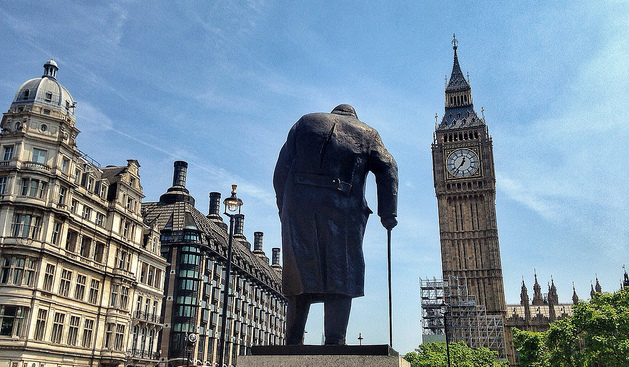Where Are the Real Leaders?

We saw Darkest Hour this week.
The year is 1940. Belgium and Holland have fallen to Hitler’s Germany. France is within days of defeat. England within days of attack. With 300,000 troops stuck in Dunkirk, Churchill becomes prime minister. No one wins by negotiating with a dictator. No nation has survived by surrendering. Churchill operates with instinct and courage, as he turns down Mussolini’s offer to negotiate peace with Hitler.
Gary Oldman delivers an Oscar worthy performance as Churchill. Flawed, constantly drinking hard alcohol, steeped in doubt, the Western world’s fate is navigated skillfully by a man who had to also navigate a tricky political situation in Parliament.
Loved the film.
It made me wonder, what happened to the real leaders? Why is leadership in such short supply in our current geopolitical firmament?
In 2017, of course, the man who has shown some courage and leadership is Emmanuel Macron in France. After decades of stagnation and cynicism, the French are feeling optimistic. It remains to be seen what actual results he can deliver, but the beginning of his Presidency has been decisive, romantic, and courageous. I am rooting for him.
I actually met him in early 2016, before he announced that he was contesting the French presidential election. He came to Silicon Valley as the French minister of economy, and I was invited to meet with him to discuss entrepreneurship strategy. I found him thoughtful and intelligent. However, the strategy he has set in motion in France is one of chasing Unicorns, which is precisely what I advised him not to do. Nonetheless, I am rooting for him. Paris is the story of 2017, with active help from Brexit-inflicted Britain that is seeing tremendous exodus of talent and business.
Other than that, Xi Jinping seems to be navigating China with a sure hand. He is also skillfully filling the void left by Trump’s America on the world stage.
I have great respect for Angela Merkel in Germany, but she is on her way out.
And in India, Narendra Modi’s policies seem to be full of grandstanding, and without substance (example: demonetization). Worse, his party’s fanning of fundamentalism may have violent long-term consequences. And alarmingly, he doesn’t quell such tendencies.
In tech, yes, we do have a set of great founders/CEOs who have established an oligarchy. Amazon’s Jeff Bezos, Facebook’s Mark Zuckerberg, and the bosses of Google, Apple, Microsoft and a few other large companies are steering their ships with great success and steadiness.
Except, in our world, inequality is increasing. Social mobility is decreasing.
An unsustainable equilibrium will, at some point, implode.
When? I have no idea.
How? I do not know.
Where are the leaders who are able to ask and answer the hard questions?
What is the substitute for religion to enable humanity to collaborate and sustain itself without destroying society’s key structures?
Is technology going too far?
Where are the leaders who are willing to ask the question: Just because we CAN, does it mean we SHOULD?
Photo credit: Brian Dooley/Flickr.com.
Featured Videos
Can 1M/1M Help Me Raise Money?
How Does 1M/1M Democratize Entrepreneurship Education?
How Does 1M/1M Democratize Management Consulting?
When Is The Right Time To Join 1M/1M?
Can 1M/1M Help Me With Business Development?
Can 1M/1M Help Me With Market Sizing?
Can 1M/1M Help Me Validate My Product?
Will I Have Private 1-on-1 Sessions In 1M/1M?
How Does 1M/1M Help Entrepreneurs Connect With Silicon Valley?
Mentoring or Consulting?
Why Does 1M/1M Charge $1000 a Year?
Why Does 1M/1M Partner With Local Organizations?
Why Don\’t Mentoring Networks Work?
Why Is It Important To Study With 1M/1M Now?
Dan Stewart Story
Vikrant Mathur Story
